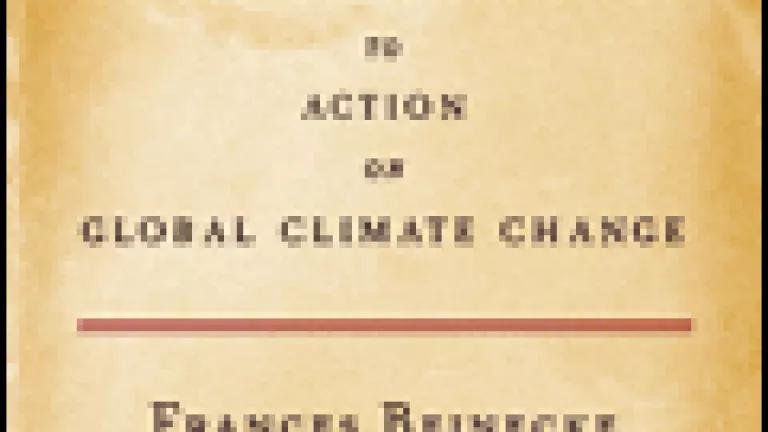
Last week, Republican Senator Lindsey Graham said, "The green economy is coming. We can either follow or lead."
The senator was explaining why he supports the clean energy and climate legislation that is currently before the Senate. His words remind us that this bill isn't just about saving the planet. It's about maintaining America's economic leadership in the 21st century.
Senator Graham is certainly not alone in this belief. In my new book, Clean Energy Common Sense, I share some of the other voices who agree that if America wants to dominate the global clean energy market, we need to take action now.
Here is how I lay out the issue in the book.
"The great race of the 21st Century will be to provide affordable clean energy to the world," said House Select Energy and Global Warming Committee Chairman Edward Markey, D-Ma.
"The Europeans, Japanese and, increasingly, Chinese are using their domestic policies to drive the development of clean energy industries and stake their claims to the burgeoning global clean energy economy," Markey said at a September committee hearing. "If we want to be globally competitive, we must do the same."
I've seen firsthand what's afoot in China. After three decades of leading the world in economic growth rates, the Chinese are out to become the top producer of green products for a waiting world.
Suntech Power Holdings, based in Wuxi, is China's largest manufacturer of panels that turn sunlight into electricity. Cushioned by handsome government subsidies, Suntech is selling its solar panels in the United States for less than it costs to make and ship them, the company's founder told the New York Times in August. The next step, Suntech founder Shi Zhengrong explained, is for the company to build manufacturing plants in the United States, much as Japanese automakers have done.
South Korea aims to become the lead supplier of batteries for plug-in hybrid cars. European Union governments are subsidizing development of strategic industries - including high-performance electricity grids and high-tech building insulation - in the hope of establishing an early market beachhead in the contest for clean tech supremacy...
"Other nations realize a critical truth," President Obama told reporters at the White House last June. "The nation that leads in the creation of a clean-energy economy will be the nation that leads the 21st-Century economy. Now's the time for the United States of America to realize this as well."
Last summer I spoke with laid off workers in Gary, Ind., a once-thriving steel town staggering through hard times. Standing in a packed and steamy union hall, though, I heard the voice of the American future.
I'd never stopped to think about it, but it takes 250 tons of steel to make single wind turbine. That means something in the American heartland.
"This is about jobs, jobs, jobs," said Tim Conway, international vice president of the United Steelworkers, representing 1.2 million Americans nationwide. "And this is about leaving a clean environment for our kids."
American workers don't want a hand out. All they want is the chance to compete. The American Clean Energy and Security Act would help to give them that chance. It's a vote of confidence in the American worker. A vote of confidence our workers deserve.
Far from that Indiana union hall, in a San Diego suburb, the clean energy future we need to create is coming off the assembly line, in the form of a hybrid bus that looks like a bullet train.
In early 2009, I got a front-row seat on one of these buses to our clean energy future, in a visit to the company that makes them, the ISE Corp. Its vehicles, company engineers explained, are powered by electric motors. Auxiliary combustion engines - burning diesel fuel or gasoline - run only when needed to generate electricity to bolster the high-performance batteries.
Low emissions and fuel efficiency are the hallmarks of these vehicles. They are not experimental. There are 230 already in use, with more than 10 million operating miles accumulated to date, in cities like New York and Las Vegas. More will be showcased at the 2010 Olympic Winter Games in Vancouver and the London Summer Games two years later.
You may have heard some of the people arguing against this bill claim that it won't create new jobs, as if making sure our workers have the tools to compete in the burgeoning global market for green energy technology somehow just isn't right. One organization making this unfortunate claim is the National Manufacturers Association, the Washington lobbying organization that represents manufacturing companies.
I'm proud of what American factories produce. I know they can compete. Over just the past decade, though, we've lost 5.5 million manufacturing jobs in this country. Good jobs, for good people. Jobs sent overseas, outsourced, downsized, eliminated, as factories were padlocked coast to coast.
Now the same folks who closed those factories want to stand in the way of good legislation that can help put Americans back to work. We're not going to let them get away with it. We believe too much in our workers for that. We believe too much in our future.
"We cannot be afraid of the future," Obama said in the Rose Garden last June. "And we can't be prisoners of the past."
"There's no longer a question about whether the jobs and industries of the 21st Century will be centered around clean, renewable energy," he said. "The only question is, which country will create these jobs and these industries? And I want that answer to be the United States of America."
